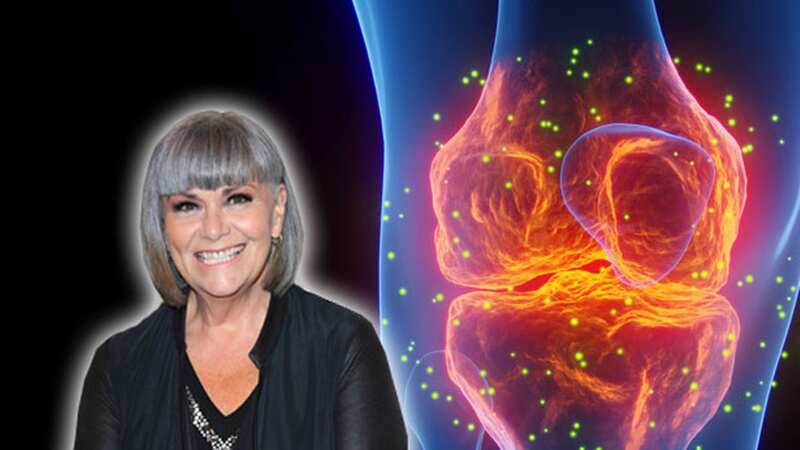Dawn French's ongoing health battle after accident left her in unbearable pain

Lighting up our screens with her infectious grin and witty humour, Dawn French has long been a staple of the UK British comedy scene.
But behind the smiles the Vicar of Dibley star is dealing with osteoarthritis, which is a painful condition affecting joints and can cause stiffness. The much-loved actress is currently recovering from knee replacement surgery following an accident at work 14 years ago which left her in increasingly unbearable pain.
Dawn hurt her knee after attempting to jump off a 10ft ledge on The Paul O'Grady Show. The stunt was an attempt to recreate the classic sitcom scene where her character, vicar Geraldine Granger, ends up chest-deep in mud after leaping into a puddle.
But landing awkwardly meant a decade's worth of 'crippling pain' for the star who has spoken openly about her battle with osteoarthritis. The degenerative joint disease is one of many different types of arthritis, affecting more than 10 million people in the UK.
Charity Versus Arthritis says: "Each type has its own causes, including the genes you inherit, injuries you’ve had, or conditions where the immune system attacks the joints. Osteoarthritis is the most common type and the one we’ve probably all heard of, often mistaken to be an inevitable condition caused by ‘wear and tear’ as we age.
 Teachers, civil servants and train drivers walk out in biggest strike in decade
Teachers, civil servants and train drivers walk out in biggest strike in decade
"In truth, it’s not simply ‘wear and tear’; our joints are made of living tissue which our bodies constantly repair and maintain, and osteoarthritis occurs when the body can no longer do this as effectively, so the cartilage becomes thin and uneven."
Symptoms of osteoarthritis
The NHS says the main symptoms of osteoarthritis are joint pain and stiffness, coupled with problems moving the joint. Some have symptoms such as:
- Swelling
- Tenderness
- Crackling or grating sound when moving the affected joints
The intensity of symptoms associated with osteoarthritis can vary a lot. Some individuals may experience mild, intermittent discomfort, while others grapple with persistent and severe issues that badly affect their day-to-day lives. Osteoarthritis can impact virtually any joint, yet it mainly causes problems in the knees, hips, and small joints of the hands. If you are experiencing persistent symptoms which could well be osteoarthritis, the NHS advises you to contact your GP.
What causes it?
Every day our joints are exposed to a continual, low-level of damage, which typically your body repairs. However, in the case of osteoarthritis, the protective cartilage at the ends of your bones deteriorates, leading to pain, swelling, and difficulty in moving the joint.
Such degeneration can result in the formation of bony growths, accompanied by swelling and redness in the affected area (though redness may be less discernible on brown and black skin). While the precise cause of osteoarthritis remains elusive, several factors are believed to heighten the risk of it developing, including:
- Joint injury: Overusing a joint before it adequately heals following an injury or surgery.
- Other conditions (secondary arthritis): Osteoarthritis can occur in joints severely affected by a preceding or existing condition, such as rheumatoid arthritis or gout.
- Age: The likelihood of developing the condition increases with age.
- Family history: Although no single gene has been identified, there is evidence that osteoarthritis may have a familial predisposition.
- Obesity: Excess body weight places added stress on joints, particularly those supporting the majority of your weight, such as knees and hips.
- Gender: Osteoarthritis is more prevalent in women than in men.
How is it treated?
Unfortunately, osteoarthritis is a chronic condition without a cure, but its progression is not necessarily inevitable, and in some instances, can gradually improve. For mild symptoms, simple measures may well make a positive difference, including:
- Regular exercise
- Weight loss if overweight
- Appropriate footwear
Using special devices to reduce the strain on your joints during your everyday activities
For more severe symptoms, additional interventions such as painkillers and a structured exercise regimen supervised by a physiotherapist may be necessary. In a limited number of cases, when standard treatments prove ineffective or joint damage is substantial, surgery may be considered to repair, reinforce, or replace the affected joint.
How can I prevent it?
While it's impossible to completely prevent osteoarthritis, you can potentially reduce your risk of developing the condition by adopting a healthy lifestyle and avoiding injuries.
Exercise plays a crucial role, but it's essential to engage in activities that don't overly strain your joints. Aim for a minimum of 150 minutes of moderate aerobic activity, such as cycling or brisk walking, each week. Additionally, incorporate strength exercises at least two days per week to target major muscle groups and promote overall well-being.
 Greggs, Costa & Pret coffees have 'huge differences in caffeine', says report
Greggs, Costa & Pret coffees have 'huge differences in caffeine', says report
Maintaining good posture and avoiding prolonged periods in the same position can also contribute to joint health. If you have a desk job, ensure your chair is at the correct height and take regular breaks to move around. Losing excess weight is another proactive measure, as being overweight or obese places added stress on your joints, increasing the risk of osteoarthritis. If you're carrying extra weight, shedding pounds may decrease your likelihood of developing the condition.
Read more similar news:
Comments:
comments powered by Disqus

































